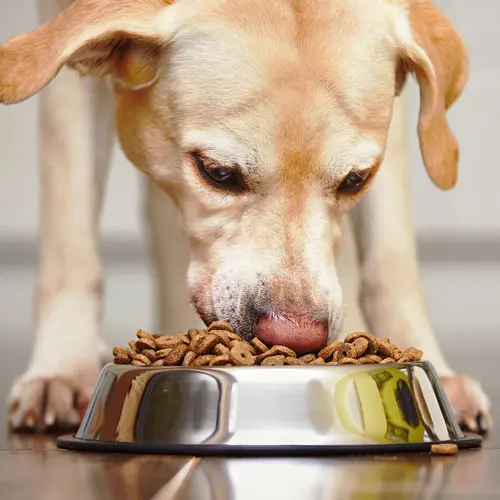What Is Nitenpyram?
Nitenpyram (Capguard, Capstar, PetArmor FastCaps) is an oral neonicotinoid insecticide medicine for treatment of adult fleas in dogs and cats. It only treats the adult stage of fleas. It does not treat other life stages of the flea such as the eggs, larva, or pupa. It does not repel fleas or ticks. Nitenpyram is only FDA-approved for use in dogs, puppies, cats, and kittens.
Nitenpyram can also be used “extra-label” or “off-label” in dogs and reptiles for the treatment of myiasis (fly larva/maggot infestation). “Extra-label” or “off-label” means that there is evidence of safe and effective use but the FDA has not approved that use.
Nitenpyram is well tolerated in animals. There is minimal risk for overdose, side effects, or drug interactions. It will start to treat the adult fleas in 20 to 30 minutes. It kills 90%-100% of adult fleas in dogs within 4 hours and in cats within 6 hours. The effects of nitenpyram only last 24 to 48 hours, so it is best to combine it with a long-term medicine to prevent fleas. Discuss flea prevention options with your veterinarian.
Nitenpyram is available from your veterinarian or over-the-counter at a pet store or online store. It is available as a tablet.
How Is Nitenpyram Used in Pets?
Nitenpyram is given by mouth daily as needed. Pets should weigh at least 2 pounds and be at least 4 weeks old before getting nitenpyram. All animals in the household should be treated at the same time to decrease the chances of the fleas returning.
Nitenpyram is used most frequently in the veterinary hospital to prevent the spread of fleas to other animals in the clinic. It can be used daily or combined with a long-term flea prevention medicine. Nitenpyram can also be given rectally. This is an option when adult fleas are found on a hospitalized pet that is sedated or under anesthesia.
When given by mouth, it is best to give nitenpyram with a small amount of food.
Always follow your veterinarian’s directions for giving medicines to animals. Remember to tell your veterinarian about any medicines, vitamins, supplements, or herbal therapies that you are giving your pet. Talk to your veterinarian before stopping any pet medicines.
What Are the Benefits of Nitenpyram for Pets?
- Nitenpyram is well tolerated by animals including puppies and kittens.
- Nitenpyram treats adult fleas quickly, starting to work within 30 minutes.
- The risk for overdose or side effects with nitenpyram is minimal.
What Follow-up Is Required With Nitenpyram?
You and your veterinarian should monitor your pet for improvement of their condition, as well as for side effects of the medicine. Signs of improvement include fewer live adult fleas, less itching, and less scratching.
Does Nitenpyram Have Warnings or Side Effects in Pets?
Do not use nitenpyram in animals that are allergic to it. Do not use nitenpyram in animals that weigh less than 2 pounds or are less than 4 weeks old. Use with caution in animals 4 to 8 weeks old or that are in poor body condition (underweight or frail). Use with caution in pregnant or nursing pets, though it is considered to be safe to give to these animals.
Nitenpyram is usually well-tolerated in animals. Most side effects are not a result of the medication, but rather a result of the adult fleas dying off. Most side effects will resolve within 24 hours without additional treatment.
Side effects include:
- Itching
- Tiredness
- Depression
- Vomiting
- Decreased appetite
- Diarrhea or loose stool
- Excitement or hyperactivity
- Panting
- Excessive drooling
While there is a low risk to have serious side effects with nitenpyram, too much can cause serious problems. This can include seizures, difficulty breathing, or difficulty walking.
If you suspect that your pet is having a serious side effect or may have been overdosed, call your veterinary clinic immediately. If it is outside of regular office hours, you may contact a local emergency veterinary hospital or an animal poison control center.
You can reach the ASPCA Animal Poison Control Center at 888-426-4435 or the Pet Poison Helpline at 855-764-7661.
Does Nitenpyram Interact With Other Medicines?
Using multiple medicines can sometimes change how your pet’s medicines work or increase your pet’s risk for serious side effects. Always tell your veterinarian about any prescription or over-the-counter (OTC) medicines, vitamins/minerals, herbal products, and other supplements that your pet is using.
There is a low risk of nitenpyram interacting with other medicines in dogs and cats.
Are There Safety Concerns for Pet Owners?
- Keep nitenpyram out of the reach of children.
- Wash your hands after giving nitenpyram to your pet.
- Do not handle nitenpyram if you are allergic to it.
What If My Pet Takes Too Much Medicine or Has an Overdose?
Nitenpyram is well tolerated by animals and the risk of an overdose is low. If you are concerned your pet is having an adverse reaction or if you suspect your pet has taken more nitenpyram than prescribed, call your veterinarian or veterinary emergency clinic immediately.
What If My Pet Misses a Dose?
If you realize that you missed a dose of your pet’s medicine, give the dose when you remember and then continue with the rest of the medicine at the correct dosing schedule. Do not double the dose of the medicine.
How Do I Store Nitenpyram?
Store nitenpyram in the original foil packet at room temperature. Protect it from light.

